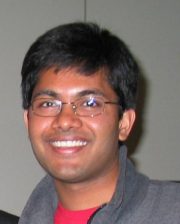IWOMP 2017 Program
Thursday, September 21
|
| 7:30AM – 10:00AM |
Registration |
| 8:15AM – 10:00AM |
Opening Session, chair: Bronis R. de Supinski |
| Welcome Address |
Dr. Barbara Chapman, SBU & BNL |
| 8:30AM Keynote |
Computational Patterns and Workflows for Digital Pathology Analytics |
Joel Saltz
 |
|
A combination of regulatory breakthroughs and technical advances will soon lead to dramatically increased clinical and research use of digital Pathology images with accompanying annual generation and analysis of exabytes of Digital Pathology data. Analytic pipelines are heterogeneous and computationally intensive – these include traditional image analysis algorithms along with a variety of machine learning methods including convolutional neural networks. I will describe the pipelines and algorithms associated with this rapidly growing and challenging domain, will describe the computational and data access patterns associated with this application domain, will address some of the performance and programming challenges we face in this application domain and discuss possible roles of OpenMP in meeting these challenges.
Joel Saltz is an MD-PhD in Computer Science, a Clinical Pathologist and Professor and Chair of the Department of Biomedical Informatics at SUNY Stonybrook. He has worked for twenty years in the area of digital Pathology and has developed and prototyped many of the methods employed in this rapidly growing field. In addition he has an extensive research track record in Computer Science systems software having developed the inspector-executor framework for parallel runtime compilation along with filter-stream program models and tools.
|
| Best Paper: Hands on with OpenMP4.5 and Unified Memory: Developing applications for IBM’s hybrid CPU + GPU systems (Parts I and II) |
Leopold Grinberg, Carlo Bertolli and Riyaz Haque |
| 10:00AM – 10:30AM |
Break |
| 10:30AM – 12:00PM |
Paper Session I: Advanced Implementations and Extensions, chair: Kelvin Li |
| Extending OpenMP SIMD support for target specific code and application to ARM SVE |
Jinpil Lee, Francesco Petrogalli, Graham Hunter and Mitsuhisa Sato |
| Compiling and Optimizing OpenMP 4.X Programs to OpenCL and SPIR |
Marcio Machado Pereira, Rafael Cardoso Fernandes Souza and Guido Costa Souza Araujo |
| Leveraging OpenMP 4.5 Support in CLANG for Fortran |
Hyojin Sung, Tong Chen, Zehra Sura, Samuel Antao, Kevin O’Brien and Tarique Islam |
| 12:00PM – 1:00PM |
Lunch |
| 1:00PM – 3:00PM |
Paper Session II: OpenMP Application Studies, chair: Christian Terboven |
| OpenMP Tasking and MPI in a Lattice QCD Benchmark |
Larry Meadows and Ken-Ichi Ishikawa |
| On the performance of parallel tasking runtimes for an irregular fast multipole method application |
Patrick Atkinson and Simon McIntosh-Smith |
| Porting VASP from MPI to MPI + OpenMP [SIMD] |
Florian Wende, Martijn Marsman, Zhenji Zhao and Jeongnim Kim |
| OpenMP SIMD Vectorization and Threading of the Elmer Finite Element Software |
Mikko Byckling, Juhani Kataja, Michael Klemm and Thomas Zwinger |
| 3:00PM – 3:30PM |
Break |
| 3:30PM – 5:00PM |
Paper Session III: Analyzing and Extending Tasking, chair: Dirk Schmidl |
| Extending OMPT to support Grain Graphs |
Peder Voldnes Langdal, Magnus Jahre and Ananya Muddukrishna |
| Patterns for OpenMP Task Data Dependency Overhead Measurements |
Joseph Schuchart, Mathias Nachtmann and José Gracia |
| Adaptive and Architecture-Independent Task Granularity for Recursive Applications |
Antoni Navarro, Josep M. Perez, Eduard Ayguadé, Sergi Mateo and Vicenç Beltran |
| Social Event 6:30 – 9:30 |
Harmony Vineyards |
Friday, September 22
|
| 7:30AM – 10:00AM |
Registration |
| 8:30AM – 10:00AM |
Day II Opening Session, chair: Stephen Olivier |
| Welcome |
| 8:30AM Keynote |
Some Thoughts on the Interoperability of MPI and OpenMP |
Pavan Balaji
 |
|
Interoperability between MPI and OpenMP is a myth. The MPI standard does not define any form of interoperability with OpenMP. What it does defines is interoperability with threads. In many cases, such interoperability can be extended to how MPI would behave with OpenMP when the mapping of computation to threads is well-defined (such as with static schedules), but for more dynamic schedules this becomes harder. As the semantics and usage models of MPI, OpenMP and hybrid MPI+OpenMP programs become richer and more complex, it is important to understand what MPI+OpenMP can do well and what it cannot. In this talk, I’ll present some thoughts on the status of hybrid programming with MPI and OpenMP, including competitors to this model such as MPI+MPI programming that uses process shared memory within the node instead of OpenMP.
Dr. Balaji holds appointments as a Computer Scientist and Group Lead at the Argonne National Laboratory, as an Institute Fellow of the Northwestern-Argonne Institute of Science and Engineering at Northwestern University, and as a Research Fellow of the Computation Institute at the University of Chicago. He leads the Programming Models and Runtime Systems group at Argonne. His research interests include parallel programming models and runtime systems for communication and I/O on extreme-scale supercomputing systems, modern system architecture, cloud computing systems, data-intensive computing, and big-data sciences.
|
| The State of OpenMP’s Productivity, Portability and Performance for Scientific Applications |
Matt Martineau and Simon McIntosh-Smith |
| 10:00AM – 10:30AM |
Break |
| 10:30AM – 12:00PM |
Paper Session IV: Extended Parallelism Models, chair: Tom Scogland |
| User Co-scheduling for MPI + OpenMP Applications Using OpenMP Semantics |
Antoine Capra, Patrick Carribault, Marc Perache and Julien Jaeger |
| Asynchronous OpenMP Tasking With Easy Thread Context Switching and Pool Control |
Xing Fan, Oliver Sinnen and Nasser Giacaman |
| A Functional Safety OpenMP for Critical Real-Time Embedded Systems |
Sara Royuela Alcazar, Alejandro Duran, Maria A. Serrano, Eduardo Quiñones and Xavier Martorell |
| 12:00PM – 1:00PM |
Lunch |
| 1:00PM – 3:00PM |
Paper Session V: Performance Analysis and Tools, chair: Larry Meadows |
| OpenMP Tools Interface: Synchronization Information for Data Race Detection |
Joachim Protze, Jonas Hahnfeld, Dong H. Ahn, Martin Schulz and Matthias S. Mueller |
| Accurate and Complete Hardware Profiling for OpenMP |
Richard Neill, Andi Drebes and Antoniu Pop |
| OpenMP Runtime Instrumentation for Optimization |
Taru Doodi, Jonathan Peyton, Jim Cownie, Maria Garzaran, Rubasri Kalidas, Jeongnim Kim, Amrita Mathuriya, Terry Wilmarth and Gengbin Zheng |
| Assessing the Performance of OpenMP Programs on the Knights Landing Architecture |
Dirk Schmidl, Bo Wang and Matthias Mueller
|
| 3:00PM – 3:30PM |
Break |
| 3:30PM – 5:00PM |
Paper Session VI: Advanced Data Management with OpenMP, chair: Greg Rodgers |
| Double Buffering for MCDRAM on Second Generation Intel Xeon Phi Processors with OpenMP |
Stephen Olivier, Simon Hammond and Alejandro Duran |
| A Pattern for Overlapping Communication and Computation with OpenMP Target Directives |
Jonas Hahnfeld, Tim Cramer, Michael Klemm, Christian Terboven and Matthias S. Müller |
| Custom Data Mapping for Composable Data Management |
Thomas Scogland, Chris Earl and Bronis de Supinski |
| 5:00PM – 5:15PM |
Closing Remarks, Barbara Chapman |

